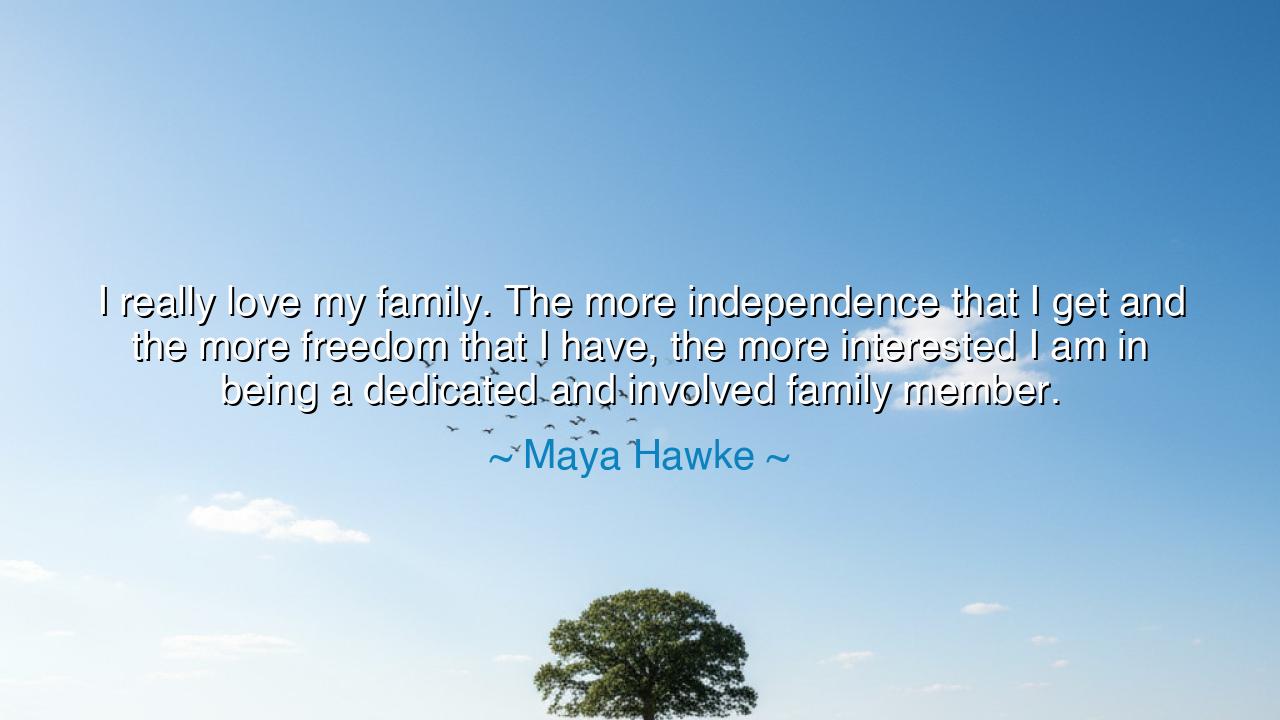
I really love my family. The more independence that I get and the
I really love my family. The more independence that I get and the more freedom that I have, the more interested I am in being a dedicated and involved family member.






The words of Maya Hawke, when she said, “I really love my family. The more independence that I get and the more freedom that I have, the more interested I am in being a dedicated and involved family member,” are a quiet but profound revelation — a truth as old as time, and as intimate as the heart itself. In her reflection, she uncovers the eternal paradox of independence and belonging: that the more we grow into ourselves, the more deeply we understand the roots that gave us life. Her words speak of a maturity that transforms rebellion into reverence, freedom into gratitude, and distance into understanding.
In youth, independence often feels like departure — a flight from the familiar, a breaking away from the bonds that shaped us. We yearn to stand alone, to test our strength in the open world. Yet as Hawke reminds us, once that freedom is truly won, the soul begins to circle back, not out of duty, but out of love. For independence, when rightly lived, is not the rejection of connection, but the fulfillment of it. It allows us to return to our families not as dependents, but as equals — not as children seeking shelter, but as individuals who have found themselves and now offer that wholeness back to the circle that raised them.
So it has ever been. Consider the story of Odysseus, who sailed from Ithaca in search of glory and wisdom. For twenty years he wandered — through war, through exile, through temptation — and though he encountered the wonders of the world, his heart remained bound to home. When he returned at last, scarred and aged, it was not conquest that fulfilled him, but reunion. His freedom, hard-won and tested, had taught him the worth of his family. It was only after he had learned to stand alone that he could truly value the hands that first held him. Hawke’s words echo this ancient tale: that true independence does not end in isolation, but in rediscovered belonging.
In her own life, Hawke speaks from a lineage steeped in artistry and creativity — the daughter of two acclaimed actors, Ethan Hawke and Uma Thurman. Born into brilliance, she might have lived forever in their shadows, but instead she chose her own path. Through her work as an actress and musician, she has sought identity on her own terms. And yet, in her journey toward autonomy, she has found herself turning again toward her family — not in dependence, but in reverence. Her freedom has deepened her love, for now she sees her family not as a foundation that confines her, but as the root that nourishes her growth. Such is the wisdom that only independence can bring — the realization that love is not a chain, but a circle.
There is a deep tenderness in her words, but also a subtle power. For she reminds us that freedom without connection is emptiness, just as connection without freedom is captivity. A bird must have both wings — the wing of independence and the wing of belonging — to fly in balance. To live only for oneself is to drift; to live only for others is to drown. True strength lies in learning to give from abundance, not need — to return to family not because we must, but because we choose to, carrying with us the fruits of our own becoming.
This truth is not limited to the family of blood, but extends to the greater family of humanity. The more we discover ourselves, the more capable we are of empathy and service. The independent soul, once matured, sees the divine thread that connects all beings. From this awareness springs generosity, understanding, and the quiet joy of belonging to something larger than the self. Thus, independence — far from isolating us — becomes the bridge through which we learn to love more wisely and more deeply.
So, O listener, take this wisdom into your heart. Do not fear independence, for it is the crucible through which love is refined. Go forth boldly into the world, seek your truth, and grow strong in solitude — but when the time comes, remember your roots. Return to your family, to your community, to your people — not as the one who needs, but as the one who gives. For the measure of independence is not how far you can go alone, but how beautifully you can return.
Thus, the teaching endures: freedom and love are not opposites, but companions. To live fully is to walk between them — to grow outward like the branches of a tree, even as your roots sink deeper into the soil of kinship. Let your independence strengthen your compassion, and let your compassion sanctify your freedom. Then, like Maya Hawke, you will know the greatest joy — to stand whole and free, and to choose, with open heart, to love and to belong.






AAdministratorAdministrator
Welcome, honored guests. Please leave a comment, we will respond soon